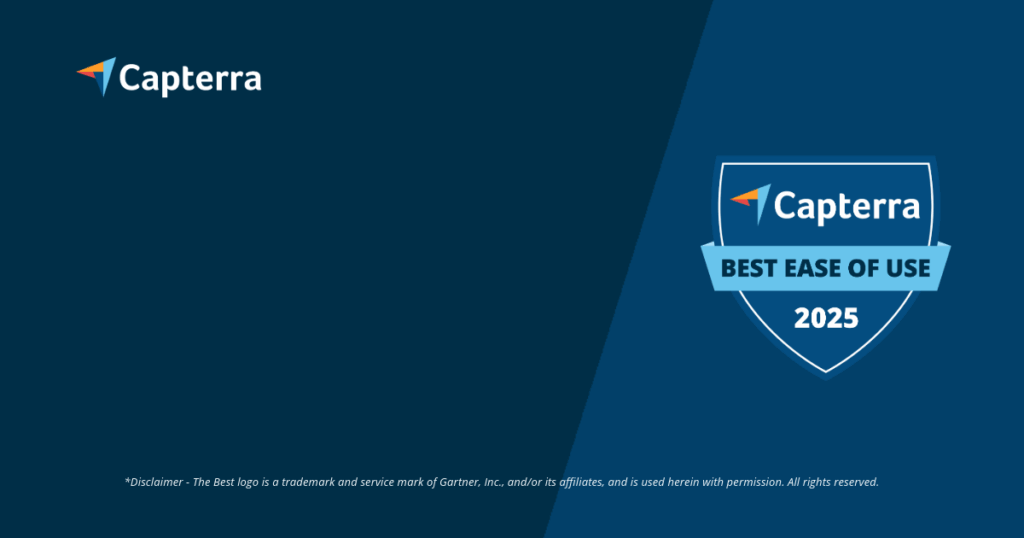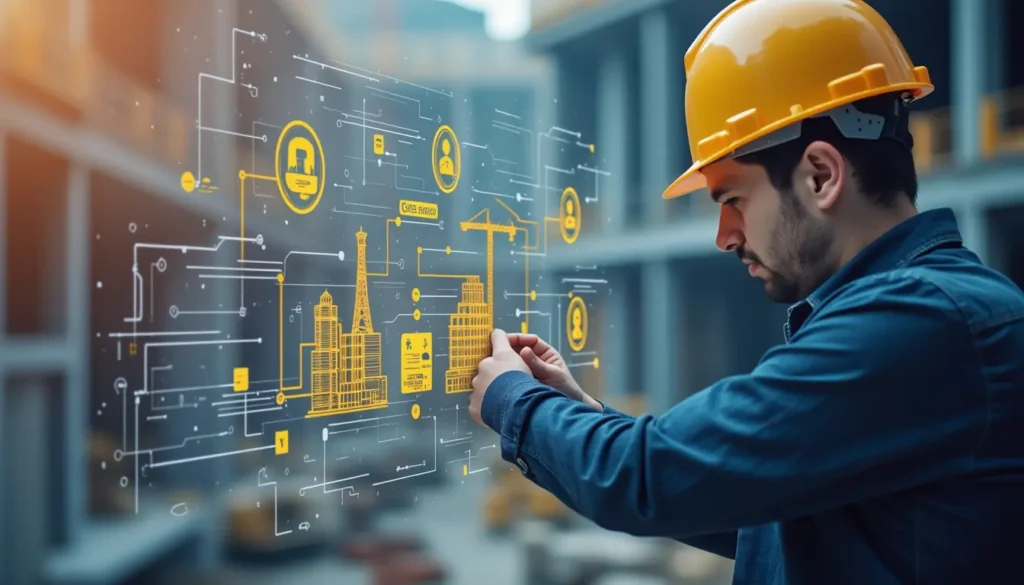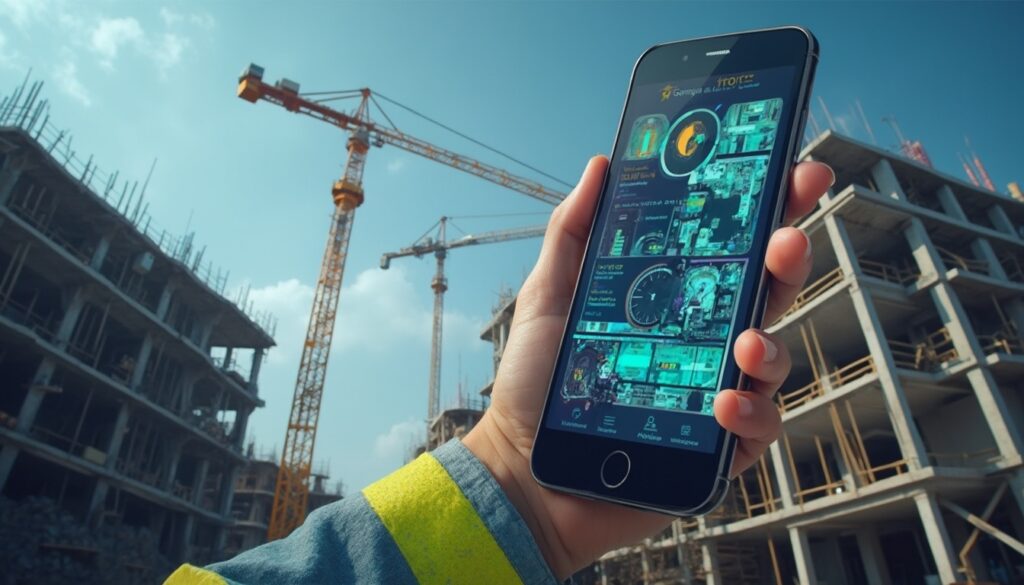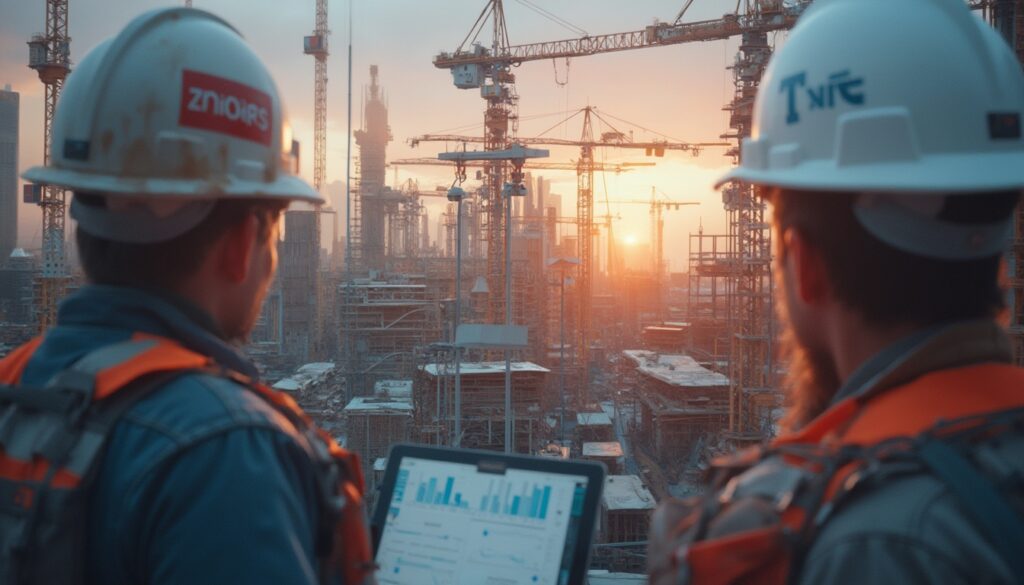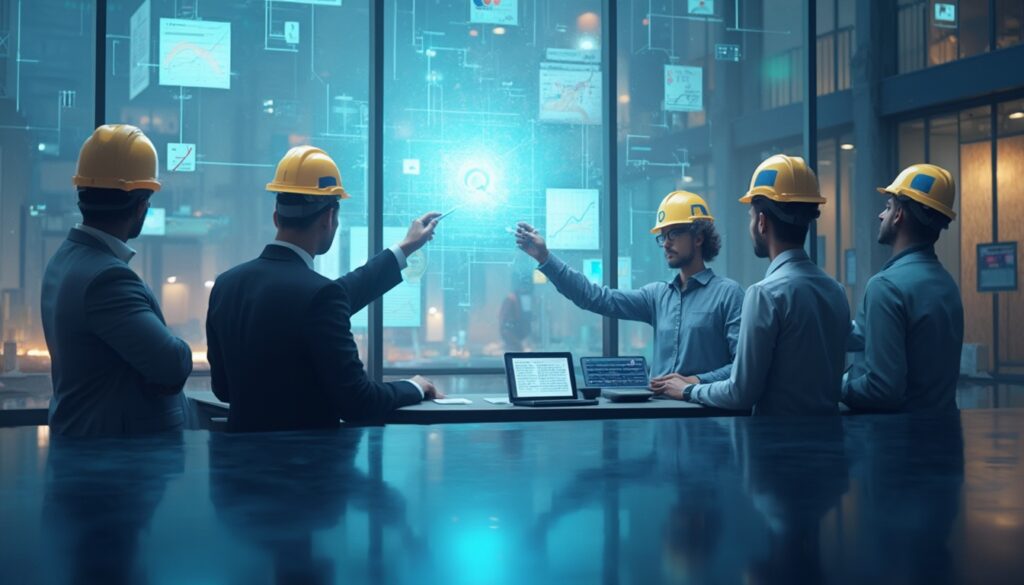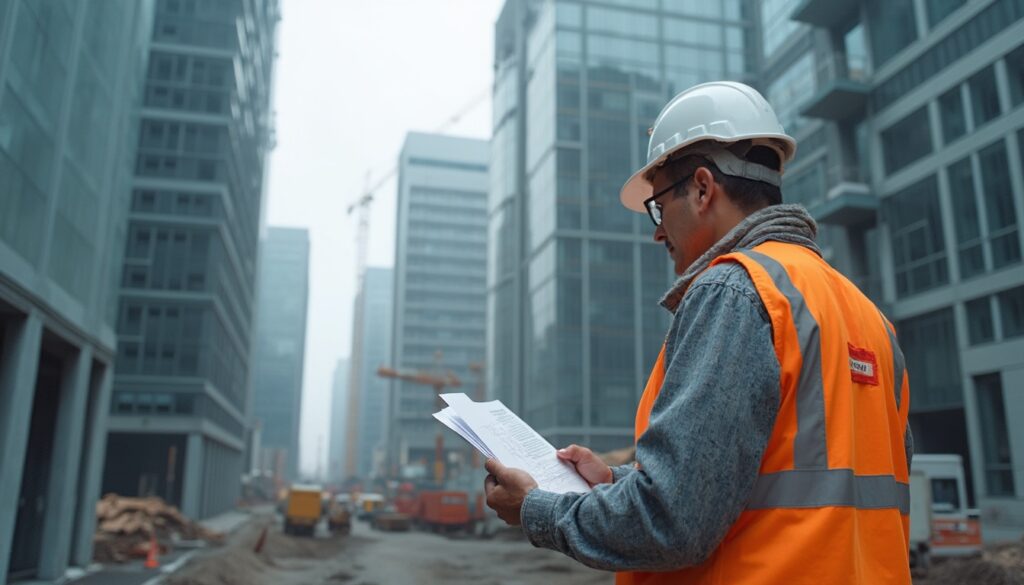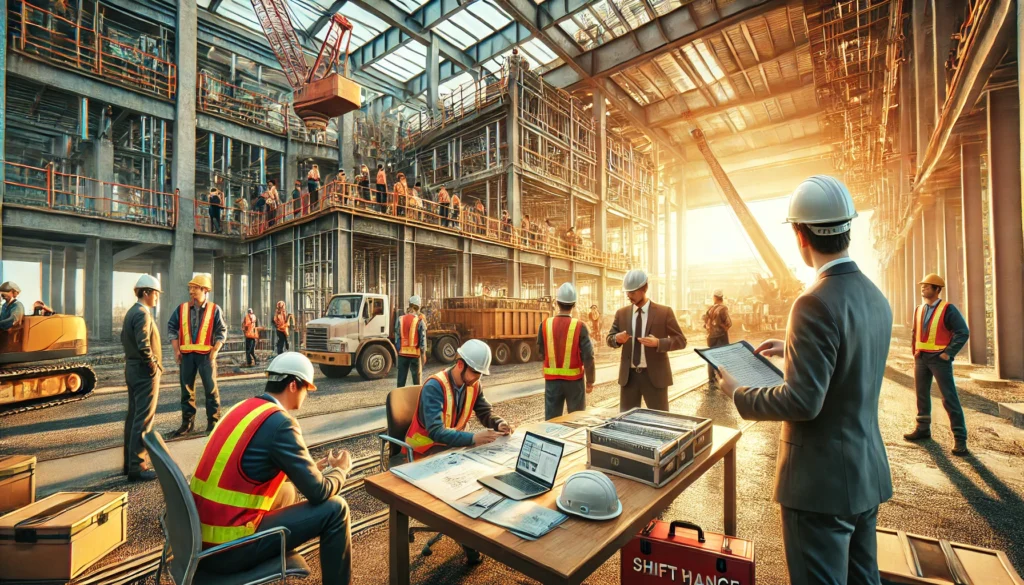AI in Construction: How Intelligent Technologies Are Revolutionizing Your Projects!
Section 01 – Introduction: AI in the Construction Industry – More Than Just a Trend
We in the construction industry all feel it: Things are happening! And at the center stands the Artificial Intelligence (AI) – it truly is the key to real transformation, where the role of AI in the construction industry is becoming increasingly clear. Many of you are certainly wondering how AI in the construction industry can change daily work. And no, this is not a short-term hype, but a profound shift that elevates efficiency, safety, and sustainability to a whole new level. When we AI in the construction industry integrate it properly, we can not only optimize old processes but also open entirely new doors when we fully harness the potentials of AI in the construction industry . This is where we at Valoon GmbH come into play: We understand the challenges, but also the huge potentials, and want to show you how to leverage this technology for yourself. Let’s explore together how your projects can take off with AI!
- Drivers of Transformation: AI is not just a trend but the key to real transformation in the construction industry.
- Creating Value: It elevates efficiency, safety, and sustainability to a new level.
- Unleashing Potentials: Through AI, old processes can be optimized, and new possibilities opened up, especially through targeted AI in the construction industry.
- Partners for Change: Valoon GmbH supports you in leveraging this technology profitably.
What does AI actually mean for the construction industry?
What does this mean for us in the construction industry when we talk about AI in the construction industry ? At its core, it is about AI helping us sift through huge amounts of data, uncover patterns, and make smart decisions based on that. The application of AI in the construction industry is a prime example. Imagine: from automatically reviewing construction plans to optimized workflows to predictive maintenance of buildings. Practically, AI can assist us in cracking complex problems, where we humans sometimes hit our limits – just think of coordinating hundreds of tasks on large construction sites or early detection of construction defects through intelligent image recognition. The applications are truly diverse and span almost every area of a project, from the initial spark of genius to the finished structure and beyond.
Why is AI so relevant for the construction industry right now?
But why is AI AI in the construction industry such a hot topic right now? There are several factors at play: cost pressure is rising, skilled professionals are hard to find, and the calls for increased sustainability and efficiency are getting louder. To be honest, we in the construction industry are trailing behind slightly in digitalization compared to other sectors – but that also means an enormous potential for improvements through AI and especially through the use of AI in the construction industry! Only now, with all the data from BIM (Building Information Modeling) and other digital tools, do we have the foundation for truly meaningful AI deployment. Additionally, AI technologies are becoming increasingly accessible and better, making them appealing to us SMEs. The pressure to manage projects faster, cheaper, and with higher quality is a real driver for the adoption of AI in the construction industry.
An Overview of the Diverse Applications of AI in Construction
Let’s take a look at where AI in the construction industry can get involved – and it really is a lot, across the entire lifecycle of a building. Even in planning, AI can assist us with Generative Design , helping architects and planners create and evaluate hundreds of design variations in a flash. In project management, AI is a strong partner for risk assessment and scheduling. On the construction site itself, autonomous robots and drones can take over monotonous or dangerous jobs. And in material management, logistics, safety monitoring, and later in facility management, AI is becoming increasingly important, as it optimizes processes and helps us make decisions based on facts. This versatility simply showcases the power of AI. AI in the construction industry immer wichtiger, weil sie Abläufe optimiert und uns hilft, Entscheidungen auf Basis von Fakten zu treffen. Diese Vielseitigkeit zeigt einfach, was für eine Wucht KI hat.AI in Action: More Efficiency for Your Construction Projects – from Planning to Execution!
Section 02 – The Key Application Areas: Where AI Truly Helps in Construction
Artificial Intelligence is transforming specific areas in construction by improving our processes and revealing new paths. The application of AI in the construction industry is no longer a distant vision of the future, but already a reality in many projects. From the first draft to handing over the keys and even beyond, AI provides us with the tools to increase precision and reduce costs, and the strategic use of AI in the construction industry plays a central role in this. Crucially, the success lies in effectively integrating AI systems into our existing workflows, for example, by connecting them with BIM data. Let’s take a closer look now at which core areas AI in the construction industry are already making significant strides and shaping the future of the construction industry decisively.
Planning and Design: Generative Design and BIM Integration
Especially in the planning and design phase, AI can shine. Tools such as AI in the construction industry leverage Generative Design. This helps architects and planners develop countless design options based on parameters such as area, number of units, or desired green space. Such AI systems can calculate millions of variants to find the best solutions regarding energy efficiency, costs, and sustainability. When we also connect AI with our BIM systems, we can analyze 3D models much more accurately. This improves construction planning and reduces errors. For example, collisions between different trades can be identified early, or the material requirements can be much more accurately determined – making the planning phase significantly more efficient..
Project Management: Enhancing Efficiency and Minimizing Risk
In project management, the use of AI is invaluable for managing complex processes and minimizing risks. AI systems can sift through contracts and emails to detect potential claims early and assess their merit. Predictive Project Management, as offered by software like ALICE Technologies, utilizes AI to predict delays and optimize construction schedules based on historical data and current project information. AI in the construction industry Gold wert, um komplexe Abläufe zu managen und Risiken zu minimieren. KI-Systeme können Verträge und E-Mail-Verkehr durchforsten, um mögliche Claims frühzeitig zu erkennen und einzuschätzen. Predictive Project Management, wie es zum Beispiel die Software ALICE Technologies anbietet, nutzt KI, um aus alten Daten und aktuellen Projektinfos The AF GROUP has used such AI project software to simulate 300 alternative scenarios, reducing project duration by 18% and costs by 15%. This demonstrates how. Die AF GRUPPEN hat mit so einer KI-Projektsoftware 300 alternative Szenarien durchgespielt und dadurch die Projektlaufzeit um 18% und die Kosten um 15% gesenkt. Das zeigt, wie AI in the construction industry can lead us to better decisions and to proactive risk management. verhilft.
Construction Execution: Automation and Robotics on the Construction Site
On the construction site itself, we benefit enormously from advances in AI, especially through automation and robotics. Autonomous construction machines like excavators and bulldozers, controlled by AI, accomplish tasks such as earth excavation with AI in the construction industryhigher accuracy and efficiency. AI-controlled robots take over repetitive and physically demanding tasks, such as bricklaying, formwork, or reinforcement work. This not only increases productivity but also makes the. KI-gesteuerte Roboter nehmen uns repetitive und körperlich schwere Arbeiten ab, zum Beispiel beim Mauern, Schalen oder bei der Stahlbewehrung. Das steigert nicht nur die Produktivität, sondern macht auch die construction site safer. Drones equipped with intelligent image recognition systems monitor construction progress, document everything comprehensively, and identify safety risks or deviations from the plan. These technologies help us make optimal use of our personnel and ensure the quality of work..The Benefits of AI in Construction: Lower Costs, Higher Quality, and a Boost for Sustainability!
Section 03 – Concrete Benefits: What Does AI Really Bring to the Construction Industry?
When we deploy AI, it’s not just a technical play. It brings us tangible benefits that positively affect the profitability, quality, and sustainability of our construction projects. Companies that are early adopters can gain AI in the construction industry einsetzen, ist das keine reine Technik-Spielerei. Es bringt uns handfeste Vorteile, die sich positiv auf die Wirtschaftlichkeit, Qualität und Nachhaltigkeit unserer Bauprojekte auswirken. Unternehmen, die hier früh am Ball sind, können sich real competitive advantages.The art of using data smartly leads to better processes, lower costs, and more satisfied project partners. With AI, we can manage typical trouble spots like exploding budgets and schedule delays much more effectively. Let’s take a closer look at what concrete advantages a strategic use of AI in construction can bring. AI in the construction industry können wir die typischen Sorgenkinder wie explodierende Budgets und Terminverzögerungen viel besser in den Griff bekommen. Lassen Sie uns mal genauer anschauen, welche konkreten Vorteile ein strategischer KI-Einsatz im Bauwesen bringt.
- Increasing Profitability: AI leads to better processes and lower costs.
- Improving Quality: More precise workflows and fewer errors are the result.
- Promoting Sustainability: Resource conservation and optimized material usage become possible.
- Securing Competitive Advantages: Early AI deployment provides an edge in the market.
Enhancing Efficiency and Reducing Costs
One of the most compelling advantages of AI is the significant increase in efficiency and the associated cost savings. Through optimized planning, for example with Generative Design, we can shorten construction times and reduce planning errors. AI-supported estimation tools like Cosuno enable AI in the construction industry more accurate cost estimates , as they access vast amounts of data and continually learn. On the construction site, robots and autonomous machines lead to faster processes in routine tasks. Additionally, AI helps us accurately plan material requirements. This means, da sie auf riesige Datenmengen zugreifen und ständig dazulernen. Auf der Baustelle sorgen Roboter und autonome Maschinen für schnellere Abläufe bei Routineaufgaben. Außerdem hilft uns AI in the construction industry, den Materialbedarf exakt zu planen. Das bedeutet less material waste and thus direct cost savings. A study even shows that AI can reduce costs in construction projects by up to 15%.
Improved Quality and Precision
The use of AI helps us significantly enhance construction quality and accuracy. Automated processes based on data analysis make us less prone to human error. AI-controlled machines and robots perform tasks with precision that is often hard to achieve manually – a real advantage in complex constructions. AI in the construction industry hilft uns auch dabei, die Bauqualität und Genauigkeit spürbar zu verbessern. Automatisierte Prozesse, die auf Datenanalysen beruhen, machen uns weniger anfällig für menschliche Fehler. KI-gesteuerte Maschinen und Roboter arbeiten so präzise, wie es von Hand oft schwer zu erreichen ist – ein echter Pluspunkt bei komplexen Konstruktionen. Real-time monitoring systems, such as drones with image recognition, allow for constant quality control throughout the construction process. Deviations from plans or potential defects can be detected and addressed early, before they lead to larger problems and costs. AI-driven anomaly detection plays an important role in ensuring long-term construction quality..
Sustainability and Resource Conservation
Sustainability is a huge topic, and AI plays a significant role here. By optimizing resource consumption, for instance through precise material requirement planning and less waste, we conserve valuable raw materials. AI systems support us in implementing a AI in the construction industry leistet hier einen wichtigen Beitrag. Indem wir den Ressourcenverbrauch optimieren, zum Beispiel durch genaue Materialbedarfsplanung und weniger Abfall, schonen wir wertvolle Rohstoffe. KI-Systeme unterstützen uns bei der Umsetzung einer sustainable circular economy, enabling material traceability, as seen in solutions like SAP’s Circular Economy 2.0. In building operations, AI can improve energy efficiency by intelligently controlling heating, ventilation, and air conditioning systems to align with user behavior and external conditions. This leads not only to lower operating costs, but also to a smaller carbon footprint of our buildings.
Key Benefits of AI in Construction
Here are some of the key advantages you can achieve through the application of AI, summarized: AI in the construction industry Increased Productivity:
- By automating routine tasks and optimizing planning, projects can be completed faster, enhancing overall productivity. Reduced Error Rates: Gesamtproduktivität erhöht.
- Reduzierte Fehlerquoten: AI systems analyze data more accurately and control machines more precisely than humans often can. The result: fewer errors and rework..
- Improved Safety Standards: AI-supported monitoring systems can detect hazards on construction sites early and prevent accidents. This significantly enhances workplace safety..
Introducing AI in Construction: These Challenges in Data, Law & Acceptance Should You Be Aware Of!
Section 04 – Challenges and Risks: Where Are the Pitfalls?
Despite all the advantages, implementing AI is not without its complexities. It is important that we are aware of possible pitfalls so we can address them from the start and increase the success chances of our AI projects. The AI in the construction industry natürlich nicht ganz ohne Tücken. Es ist wichtig, dass wir uns möglicher Stolpersteine bewusst sind, um sie von vornherein anzugehen und die Erfolgschancen unserer KI-Projekte zu erhöhen. Die digital transformationthat comes with AI requires not only new technology but also a rethink in corporate culture and our workflows. The specific risks associated with AI range from technical limitations to legal uncertainties to the need to involve our employees in this journey. A careful examination of these points is crucial for a long-term successful AI strategy and to fully leverage the AI in the construction industry reichen von technischen Grenzen über rechtliche Unsicherheiten bis hin zur Notwendigkeit, unsere Mitarbeiter auf diesem Weg mitzunehmen. Eine genaue Betrachtung dieser Punkte ist entscheidend für eine langfristig erfolgreiche KI-Strategie und um die digitalization in the construction industry. voll auszuschöpfen.
Data Quality and Availability
One of the biggest hurdles for the meaningful application of AI is the quality and availability of our data. AI models are only as smart as the data we feed them. In the construction industry, where digitalization is often not yet advanced, data is often lacking, inconsistent, or not in the right format for AI analyses. Many underestimate the effort involved in data preparation and structuring. We need a clear data strategy to collect comprehensive and accurate data and make it suitable for AI applications. Without a solid data foundation, AI systems can yield inaccurate or even incorrect results, severely limiting the benefits of AI. AI in the construction industry ist die Qualität und Verfügbarkeit unserer Daten. KI-Modelle sind eben nur so schlau wie die Daten, mit denen wir sie füttern. In der Baubranche, wo die Digitalisierung oft noch nicht so weit fortgeschritten ist, sind Daten häufig Mangelware, uneinheitlich oder nicht in der richtigen Form für KI-Analysen vorhanden. Viele unterschätzen den Aufwand für die Datenaufbereitung und -strukturierung. Wir brauchen eine klare Datenstrategie, damit wir umfassende und korrekte Daten sammeln und für KI-Anwendungen fit machen. Ohne eine solide Datenbasis können KI-Systeme ungenaue oder sogar falsche Ergebnisse liefern, was den Nutzen von AI in the construction industry natürlich stark einschränkt.
Legal and Ethical Aspects
The use of AI helps us significantly enhance construction quality and accuracy. Automated processes based on data analysis make us less prone to human error. AI-controlled machines and robots perform tasks with precision that is often hard to achieve manually – a real advantage in complex constructions. AI in the construction industry also raises tricky legal and ethical questions. A major concern is liability: Who is responsible if an AI system makes a mistake that leads to property damage or even personal injury? The current legal framework often does not provide clear answers. Data protection, with GDPR being a key aspect, is another challenge, especially when using drones and cameras for construction site monitoring. The new regulations also pose additional requirements, such as training employees in the use of AI systems. These points necessitate careful consideration and clear rules to minimize risks. Acceptance and ResistanceWhether the introduction of AI will be successful largely depends on the acceptance of our employees. There is often skepticism or even resistance to new technologies, usually stemming from fears of job loss or a lack of trust in the systems. It is super important to involve employees early in the change process, openly communicate the benefits of AI, and provide
Akzeptanz und Widerstand
Ob die Einführung von AI in the construction industry ein Erfolg wird, hängt ganz entscheidend von der Akzeptanz unserer Mitarbeiter ab. Oft gibt es Skepsis oder sogar Widerstand gegen neue Technologien, meist aus Angst vor Arbeitsplatzverlust oder weil das Vertrauen in die Systeme fehlt. Es ist super wichtig, die Mitarbeiter frühzeitig in den Veränderungsprozess einzubinden, die Vorteile von KI offen zu kommunizieren und comprehensive training. Internal pioneers and an open culture of mistakes can help overcome reservations. Leaders play a key role here: They must demonstrate a positive attitude towards AI and clearly communicate that AI is meant to support us and not replace us. AI in the construction industry vorleben und klar machen, dass KI uns unterstützen und nicht ersetzen soll.Successfully Establishing AI in Construction: With Strategy, Data Know-how, and the Team to Success!
Section 05 – Best Practices: How to Successfully Implement AI in Construction
For the implementation of AI to be truly successful, we need a strategic and well-thought-out approach. It’s not enough to simply purchase technology; rather, AI must be understood as an integral part of corporate development. Companies that AI in the construction industry follow best practices can fully leverage the potentials of AI while minimizing risks. This starts with clearly defining goals and goes all the way to continuously adapting the systems during ongoing operations. We at Valoon GmbH are happy to accompany you in developing and implementing your individual AI strategy to ensure that befolgen, können die Potenziale von KI voll ausschöpfen und gleichzeitig Risiken minimieren. Dies beginnt bei der klaren Definition von Zielen und reicht bis zur kontinuierlichen Anpassung der Systeme im laufenden Betrieb. Wir von der Valoon GmbH begleiten Sie gerne bei der Entwicklung und Umsetzung Ihrer individuellen KI-Strategie, um sicherzustellen, dass AI in the construction industry becomes a success factor for your company and positively shapes the future of the construction industry. positiv gestaltet.
- Strategic Approach: A well-thought-out strategy is crucial for AI success.
- Integral Part: AI must be seen as part of corporate development, not just as a technology purchase.
- Utilizing Best Practices: Following best practices maximizes potentials and minimizes risks.
- Continuous Adjustment: From goal definition to ongoing optimization, a continuous process is necessary.
Strategic Planning and Leadership
A successful AI introduction must be desired and actively driven by top management. It’s the responsibility of leadership to recognize the transformative effects of AI on business models and processes and to develop a clear vision. Dedicated digitalization departments or designated AI managers can help structure the implementation and accelerate it. It is important to define concrete use cases and measurable goals so we can demonstrate the benefits of AI investments and clarify the added value of AI. A strategic approach ensures that AI projects contribute to the broader corporate goals and do not just end up as mere technology experiments. AI in the construction industry auf Geschäftsmodelle und Prozesse zu erkennen und eine klare Vision zu entwickeln. Eigene Digitalisierungsabteilungen oder benannte KI-Verantwortliche können helfen, die Einführung zu strukturieren und Gas zu geben. Wichtig ist, konkrete Anwendungsfälle und messbare Ziele zu definieren, damit wir den Nutzen von KI-Investitionen auch nachweisen können und der Mehrwert von AI in the construction industry klar wird. Eine strategische Herangehensweise sorgt dafür, dass KI-Projekte auf die großen Unternehmensziele einzahlen und nicht nur als reine Technik-Experimente enden.
Data Management and Quality
Solid data management is the be-all and end-all for the successful application of AI. This includes a comprehensive data strategy that determines which data we collect, how we store, process, and protect it. Ensuring high data quality is essential, as faulty or incomplete data can lead AI systems to draw incorrect conclusions. Consistent interfaces and data formats make it easier to integrate AI into existing IT systems and share data between different systems. We must pay special attention to the protection of sensitive data and compliance with data protection regulations, for example through anonymization or pseudonymization. Investing in good data infrastructure is a prerequisite for effective AI applications. AI in the construction industry. Dazu gehört eine umfassende Datenstrategie, die festlegt, welche Daten wir sammeln, wie wir sie speichern, aufbereiten und schützen. Die Sicherstellung einer hohen Datenqualität ist unerlässlich, denn fehlerhafte oder unvollständige Daten können dazu führen, dass unsere KI-Systeme falsche Schlüsse ziehen. Einheitliche Schnittstellen und Datenformate machen es einfacher, KI in bestehende IT-Systeme zu integrieren und Daten zwischen verschiedenen Systemen auszutauschen. Ein besonderes Augenmerk müssen wir auf den Schutz sensibler Daten und die Einhaltung von Datenschutzrichtlinien legen, zum Beispiel durch Anonymisierung oder Pseudonymisierung. Die Investition in eine gute Dateninfrastruktur ist eine Grundvoraussetzung für leistungsfähige KI-Anwendungen.
Mitarbeiterschulung und -einbindung
Employee Training and Involvement AI in the construction industryPeople are the key to success in implementing AI. Comprehensive training programs are necessary to equip employees with the necessary skills to handle new AI systems and alleviate their fears. Transparent communication about goals, benefits, and also the limitations of AI promotes acceptance and trust in technology. It is important to create an atmosphere of collaborationwhere humans and AI act as a team and complement each other. When we involve employees in the selection and design of AI solutions, they can better identify with the new tools and bring valuable practical knowledge. Fostering a learning organization is crucial for the sustainable use of AI. AI in the construction industry.
Wichtige Schritte zur KI-Implementierung
Important Steps for AI Implementation AI in the construction industry For a successful introduction of AI, we recommend the following steps:
- Needs Analysis and Goal Definition: Identify specific problems or processes that can be optimized through AI and set clear, measurable goals. This ensures that AI investments deliver real value.
- Establishing a Data Foundation: Check the existing data quality and quantity. Develop a strategy for data collection, processing, and management. Without a solid data foundation, effective AI is not possible.
- Starting Pilot Projects: Begin with manageable pilot projects to gain experience and demonstrate the benefits of AI in a limited scope. This minimizes risks and creates acceptance.
AI Successes in Construction: These Examples Show How It’s Done!
Section 06 – Success Stories: Who is Successfully Using AI in Construction
The entire theory surrounding AI becomes tangible through concrete success stories. Many companies have already recognized the potential of this technology and are profitably implementing AI in their projects. These case studies not only demonstrate the diverse applications but also the measurable results that can be achieved through the use of AI. From reduced costs to time savings to improved quality – these practical examples prove that AI is no longer a dream for the future, but a AI in the construction industry wird am besten durch konkrete Erfolgsgeschichten greifbar. Viele Unternehmen haben schon erkannt, was für ein Potenzial in dieser Technologie steckt und setzen KI gewinnbringend in ihren Projekten ein. Diese Fallstudien zeigen nicht nur die vielfältigen Einsatzmöglichkeiten, sondern auch die messbaren Ergebnisse, die durch den Einsatz von AI in the construction industry erzielt werden können. Von weniger Kosten über Zeitersparnis bis hin zu besserer Qualität – die Praxisbeispiele beweisen, dass KI kein Zukunftstraum mehr ist, sondern ein powerful tool for today’s construction industry.When we look at these success factors, other companies can gain valuable ideas for their own AI strategy and pave the way for broader deployment.
Case Studies of Companies that Have Successfully Implemented AI
Several pioneers in the construction industry impressively showcase the advantages of AI. The AI in the construction industryAF GROUP for example, used the ALICE AI project software to create over 300 alternative project scenarios. The result: an impressive reduction in project duration by 18% and costs by 15%. The real estate company zum Beispiel hat die ALICE KI-Projektsoftware genutzt, um über 300 alternative Projektszenarien zu erstellen. Das Ergebnis: eine beeindruckende Verkürzung der Projektlaufzeit um 18% und der Kosten um 15%. Das Immobilienunternehmen NREP used generative design tools from Autodesk Forma (formerly Spacemaker) to optimize projects, creating 6% more living space and better daylight exposure. The Austrian highway company ASFINAG utilizes the Building Information Cloud to visualize construction data and optimize logistics processes. Even large players like PORR actively conduct pilot projects with selected construction teams to learn and implement the targeted use of AI. These examples show that AI can lead to significant improvements across the industry. AI in the construction industry branchenweit zu deutlichen Verbesserungen führen kann.
Analysis of Success Factors
The successful introduction of AI depends on several key factors. A AI in the construction industry clear strategic direction klare strategische Ausrichtungbacked by management is essential. Companies need to determine which specific problems they want to solve with AI. Secondly, a high data quality and availability is essential; AI systems need clean, structured data to deliver accurate results. Thirdly, engaged and well-trained employees play a crucial role. The acceptance and know-how of users are critical to success. Fourthly, a gradual development and continuous improvement has proven beneficial. Instead of waiting for the perfect overall solution, companies should start with pilot projects and gradually optimize and roll out the AI systems. The combination of these factors allows for the full potential of AI to be leveraged. schrittweise Entwicklung und kontinuierliche Verbesserung bewährt. Statt auf die perfekte Gesamtlösung zu warten, sollten Unternehmen mit Pilotprojekten starten und die KI-Systeme nach und nach optimieren und ausrollen. Die Kombination dieser Faktoren ermöglicht es, das volle Potenzial von AI in the construction industry auszuschöpfen.The Future with AI in Construction: These Trends and Potentials Are What We Are Focusing On!
Section 07 – The Future of AI in Construction: Trends and Outlook
The development of AI is just beginning, but the trends and potentials we are already seeing are truly promising. The technology is advancing rapidly and constantly opening up new application fields and optimization opportunities, underscoring the importance of AI. We can expect that AI will become an integral part of most construction projects in the coming years, from small renovations to huge construction endeavors. The AI in the construction industry steht erst am Anfang, aber die Trends und Potenziale, die wir schon sehen, sind echt vielversprechend. Die Technologie entwickelt sich rasant weiter und eröffnet ständig neue Anwendungsfelder und Möglichkeiten zur Optimierung, was die Bedeutung von AI in the construction industry unterstreicht. Wir können davon ausgehen, dass KI in den kommenden Jahren ein fester Bestandteil der meisten Bauprojekte sein wird, von der kleinen Renovierung bis zum riesigen Bauvorhaben. Die progressive digitalization of the sector creates the necessary foundation for increasingly intelligent and autonomous systems. Companies that are already focusing on the future developments of AI are optimally positioning themselves for tomorrow’s competition and can actively shape the AI in the construction industry beschäftigen, stellen sich optimal für den Wettbewerb von morgen auf und können die revolution in the construction industry. Technological developments
Technologische Entwicklungen
The technological advances in the field. AI in the construction industry are rapid. We expect further developments in Generative Design tools that will take into account even more complex parameters and provide architects and planners with more precise and innovative design suggestions. The integration of AI into BIM systems will deepen, leading to a more seamless and intelligent 3D model analysis. On construction sites, the level of automation through robotics will further increase; autonomous machines will not only handle standard tasks but will also be capable of performing more complex activities. In addition, AI-based sensors and the Internet of Things (IoT) will enable even more detailed real-time monitoring of construction processes and material conditions, thereby further enhancing efficiency and safety. The trade-offs must always be considered.
Societal impacts
The increasing use of AI in the construction industry will also have significant societal impacts. On one hand, jobs and skill profiles will change. Routine tasks will be more automated, while new roles in data analysis, AI management, and robotics control will emerge. This requires investments in training and education, to prepare professionals for the new challenges. On the other hand, AI significantly contributes to sustainability by helping to use resources more efficiently and reduce the ecological footprint of construction projects. Furthermore, safety and health protection on construction sites can be substantially improved through AI-based systems that identify hazards early and prevent accidents. The
Economic potentials
The economic potential of AI in the construction industry is enormous. By increasing efficiency in planning and execution, companies can significantly enhance their competitiveness. Lower costs, shorter project durations, and higher construction quality lead to an improved profitability. AI also enables the development of new business models and innovative services, such as predictive maintenance of buildings or optimized energy supply. For the economy as a whole, the wide application of AI in the construction industry can contribute to sustainable economic growth and the creation of new, future-proof jobs. In Germany alone, the economic potential of AI in the construction industry is estimated to be worth several billion euros over the next ten years. The maximization of efficiency through AI is a clear economic driver.
Future AI applications in construction
Some future applications of AI in the construction industry, which we can look forward to:
- Hyper-automation: An even stronger automation of complete processes, from planning to procurement to execution, controlled by connected AI systems. This will drastically reduce lead times.
- Digital twins with predictive capabilities: Enhanced digital twins of buildings that not only show the current state but also predict future behavior and maintenance needs using AI. This optimizes the entire lifecycle.
- AI-powered circular economy: Systems that automatically plan and control the optimal reuse of construction materials to minimize waste and conserve resources. This promotes a true circular economy in construction.
AI as a foundation: Together shaping the future of the construction industry!
Section 08 – Conclusion: AI as a key technology for the future construction industry
Our little journey through the world of AI in the construction industry has hopefully shown: Artificial Intelligence is much more than just a buzzword. It is a real key technology that has the potential to fundamentally change how we plan, build, and manage buildings. The many applications – from smart planning to efficient construction sites to sustainable building operation – demonstrate the power of AI. Clearly, there are challenges in implementation, but the opportunities are simply vast. Companies that invest wisely now and involve their teams, not only strengthen their own position but also actively shape a more efficient, safer, and sustainable future for all of us in construction. We at Valoon GmbH are happy to be your competent partner in unlocking these potentials for your company. AI in the construction industry investieren und ihre Teams mit ins Boot holen, stärken nicht nur ihre eigene Position, sondern gestalten aktiv eine effizientere, sicherere und nachhaltigere Zukunft für uns alle im Bau. Wir von der Valoon GmbH sind da gerne Ihr kompetenter Partner, um diese Potenziale für Ihr Unternehmen zu heben.
Summary of Key Findings
Artificial Intelligence offers the construction industry enormous opportunities for increasing efficiency, reducing costs, and improving quality. From generative design in planning to predictive project management to autonomous robots on site – the areas of application are diverse. Success stories already demonstrate that through the use of AI in the construction industry significant improvements in project durations and costs can be achieved. At the same time, challenges such as data quality, legal frameworks, and employee acceptance must be actively addressed. A strategic approach, investments in data management, and employee training are crucial for success. The AI in the construction industry is a decisive factor for the future viability of construction companies.
Appeal to companies to seize the opportunities of AI
The opportunities that AI in the construction industry presents are clear and are a great way for all of us to prepare for the future. Don’t wait until others pass you by! Seize the opportunity now to improve your workflows, cut costs, and enhance the quality of your projects. We at Valoon GmbH help you find the right AI solutions tailored to your specific needs and successfully implement them. Especially because we specialize in making data collection and processing easier, for example by connecting messaging services like WhatsApp, we are your ideal partner for entering the world of AI in the construction industry. Remember: An investment in AI is an investment in the future and success of your company.
Outlook on the further development and potential of AI in construction
And what’s next? The development of AI in the construction industry will accelerate significantly in the coming years. We can look forward to even smarter algorithms, a closer integration with our existing systems, and ever more autonomous machines and processes. The ability to evaluate huge amounts of data in real-time and derive precise forecasts and recommendations will revolutionize the way we make decisions at every project stage. It will increasingly be about creating sustainable, resource-efficient, and simply livable buildings. For all companies that want to actively shape this transformation, there are huge opportunities for innovation and growth in AI in the construction industry . Discover with us at Valoon what AI can do for your business! Simply contact us today for a personal consultation and start your journey into the future of construction. Register for more information or directly make an appointment through our contact page .Any questions? Further insights and next steps!
Placeholder content for Section 9
How can AI specifically help in my construction company if my employees are not IT-savvy?
AI solutions like those from Valoon rely on simplicity and familiar tools. This way, your field staff, for example, can collect data via familiar messaging services like WhatsApp, which are then structured and processed automatically – all without complex software training.
What data does AI need in the construction industry and how can I ensure my data is good enough?
AI requires high-quality, structured data from various project phases, e.g., from BIM models, sensors, or communications. A clear data strategy for collection and processing is important. Solutions that automatically make unstructured data (e.g., chat messages) usable are especially helpful here.
Can AI really reduce costs in construction projects and if so, how?
Yes, AI can significantly reduce costs. Through optimized planning, more precise material estimation, and fewer errors construction costs can be reduced by up to 15% as well. The automation of routine tasks also contributes to cost efficiency.
What are the biggest risks when using AI in construction and how can I safeguard myself?
The risks include issues of data quality, data protection (GDPR), and liability in case of AI errors. Clear contractual regulations are important, as well as careful selection of data protection compliant systems and the maintenance of human oversightin critical decisions. How does AI help counteract the skills shortage in the construction industry? bei kritischen Entscheidungen.
Wie hilft KI, dem Fachkräftemangel in der Baubranche entgegenzuwirken?
AI can automate physically demanding or repetitive tasks and thus relieve skilled workers. Additionally, the use of modern technologies makes construction professions more attractive. AI systems can also help to digitalize and make more widely available the knowledge of experienced employees. Do we need to overhaul our entire IT infrastructure for AI solutions?
Müssen wir für KI-Lösungen unsere gesamte IT-Infrastruktur umstellen?
Not necessarily. Many modern AI solutions, especially SaaS platforms like Valoon, are designed to be flexibly integrated into existing systems or connected through simple interfaces (e.g., API, web application). The focus is often on low entry barriers.
What role does Building Information Modeling (BIM) play in the deployment of AI?
BIM provides the structured data foundation, which is essential for many AI applications in construction. AI can analyze BIM data to, for example, identify planning errors early, conduct collision checks, or optimize construction workflows..
How do I best start with AI in my company without investing a huge budget?
Start with a clear analysis of your most pressing problems and identify areas where AI can bring the most benefit. Begin with manageable pilot projects and use solutions that allow for a quick start, such as optimizing construction site communication and documentation.
